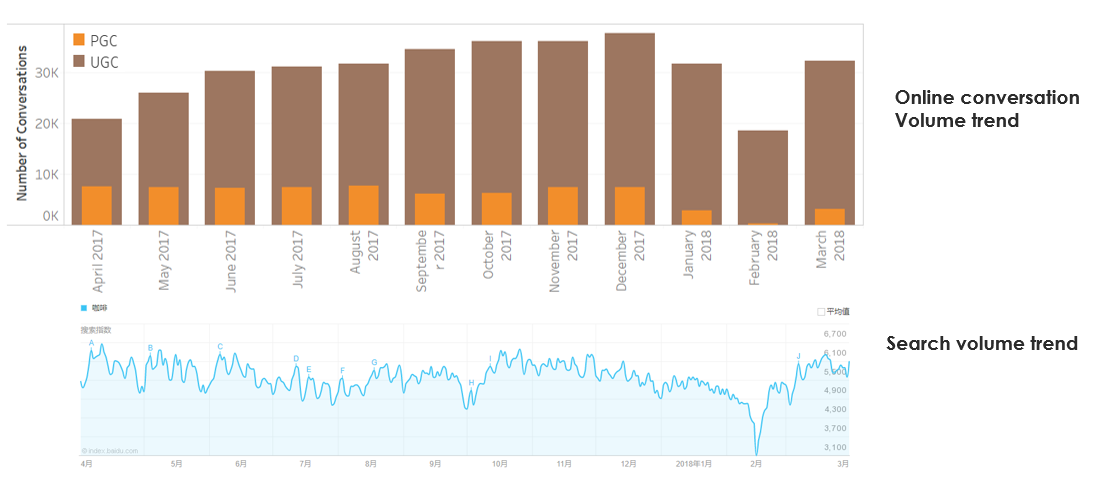Applying large-scale data for business intelligence has never been more prevalent than right now. Digital opinion mining, a synonym for sentiment analysis, is the study of people’s attitudes and opinions towards entities, events, topics and their attributes online. The benefits of utilising these data reach far beyond solely creating a marketing or product strategy. It provides continuous market and customer intelligence.
Digital opinion mining uses artificial intelligence, particularly in the field of natural language processing, to analyse text and computational linguistics. Relevant information is then identified and extracted from the sources; they are largely from review sites, forums, and social media channels. How is this important, especially for your market and product insights team?
Growth of Opinion-Rich Resources Online
Companies often conduct market research, be it qualitative or quantitative, to gather information and find out what consumers think of their products or campaigns. New market research methods such as digital ethnography has been created in view of the availability of new technology such as digital opinion mining. Online users provide rich context during their experience of a brand/product on forums, review and blogs. It has never been easier for consumers to explore alternative products in the market before committing to a purchase.
This alternative source of information provides valuable insights to what people think about the companies’ products. However, finding opinion sources and monitoring the huge volume of information online can still be a daunting task. It is very challenging for a human reader to search for the right sources, extract relevant sentences, summarise and classify them into applicable insights. An automated opinion mining system will be required.
Analysing Opinions Like Human Readers Do
The advances in deep learning improves the ability of algorithms to analyse text more like the mind of a human being. This is immensely useful for doing in-depth research. Conversations can then be grouped according to the key attributes of a brand’s product and the aspects consumers are concerned about. From there, companies can be more precise with their business planning to provide to the needs of their customers.
The basic goal of digital opinion mining is sentiment classification. It is to classify the opinions gathered into positive, neutral or negative classes. Sentiment analysis aims to determine the attitude of a user pertaining to a certain topic. This can be further divided into feature opinion, aspect sentiment, and target sentiment classification, to have a deeper understanding of consumers’ attitudes towards the feature performance, appearance and brand respectively. Let’s understand this better with an illustration on Chinese consumers and their attitude towards coffee in China.
Deep Diving Into Chinese Consumer’s Attitude Towards Coffee
China has traditionally been known as a tea drinking country for centuries. However, in the last few years, it has one of the fastest growing coffee consumers in the world- particularly among young Chinese professionals. By leveraging on artificial intelligence-powered methodology to analyse the Chinese coffee market landscape online for a period range, it is possible to gain deep insights on consumers’ behaviour and attitude, and understand their perceptions towards coffee products.

Young working professionals lead in the consumption of coffee in China. These consumers are also getting more health-conscious. They prefer to have black coffee as a part of their diet plan than the usual flat white. Functional drinks that bring additional health benefits such as weight loss are growing popular among Chinese consumers.
It is also found that Chinese coffee drinkers place buying experience as a priority. It is not solely about the products. They like well-furnished coffee shops, with soothing music and coffee aromas. The coffee shops are viewed as the best places to go to, to get away from work stress. Developing a sophisticated coffee preference also display a person’s class and status. These lifestyle preferences are reflective of white-collar workers in big Chinese cities.

Digital opinion mining also uncovered the negativity associated with drinking coffee in relation to the side-effect it causes, such as insomnias. Companies can benefit from using digital opinion mining to uncover the nuances associated with consuming a product to make the consumption experience better.
The above findings would be valuable, especially for a company offering coffee as a product or an item on the menu. With the information, they will have a better understanding of Chinese consumers’ consumption behaviour towards food & beverage, and traits of the Chinese consumers regarding purchasing factors, needs, aspirations, motivations, concerns and barriers to purchase.
The Future Of Digital Opinion Mining
Digital opinion mining is still evolving as artificial intelligence technology advances. It will move beyond the positive, neutral and negative gauges to achieve deeper, broader insights. Sentiment analysis is an important tool for companies looking to learn more about their customers, and to measure and predict outcomes. Consumer researchers should investigate how using digital opinion mining and other forms of new market research method such as digital ethnography can help in better understanding of their consumers.
